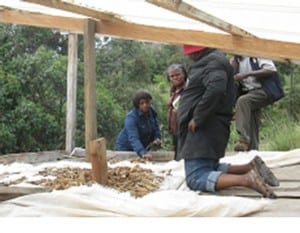
By Kenmene Lea Alida
The project, which aims at ensuring sustainable management of biodiversity of Mount Bamboutos through the promotion of fair and equitable distribution of benefits from the exploitation of Echinops giganteus, is being executed by ERuDeF with the grant from GEF Small Grants Projects.
After 10 months of execution, the UNDP/GEF SGP’s National Coordinator, Dr. Mpeck Nyemeck Marie-Laure, visited the project area accompanied by a team from ERuDeF in order to monitor progress of activities and assess the level of participation and understanding of the beneficiary community.
The President of MoBECoS, Landnus Tandwun, welcomed the GEF Coordinator to their community and gave a brief history of the ABS Echinops project.
He explained that Walter Tacham, a lecturer at the University of Bamenda, introduced the project to them and because of it, some of them are now capable of sending their children to school through the sale of Echinops roots.
Tandwun said they received training on book-keeping and financial management and some of them are no longer carrying out farming activities blindly. They now keep records in order to understand the flow of the business; to know if their activities are profitable or not. He added that they are very happy with the initiative since the ERuDeF Echinops Project Coordinator has taught them how to cooperate and to work hand in hand for their growth.
One of the women engaged in the project explained that at the beginning they were reluctant because they did not know what was going on, but now they have realized the importance of the project, reason why they have joined MoBECoS.
Some expressed gratitude for the tree planting activities going on at the landslide site and around the water catchments, among others.
To have an appraisal of the work done so far, a brief meeting was held with the members of Magha-Bamumbu community, various sites of project activities were visited and a debriefing meeting was held with the ERuDeF team.
To evaluate the local population’s perceptions and participation in the implementation of GEF SGP project and to assess its effect on their livelihoods, a meeting was organized which was attended by 44 persons.
The GEF SGP Coordinator expressed her joy of being in Magha-Bamumbu and thanked the local population for taking time off to honor the invitation.
Dr. Mpeck Nyemeck recalled that Magha-Bamumbu pioneers the implementation of the ABS principle in Cameroon and will be privileged to share lessons learned with other communities across the nation. Their involvement in the sale of Echinops roots, she said, will bring direct income to the community as well as royalties from the sale of products processed from the plant.
The team equally visited other project sites as well as the agro-forestry nursery, the landslide site where reforestation activities are going on and the agronomics test plots. In each of these sites, community members were asked to describe and explain the process.
At the end of visit, the GEF SGP Coordinator noted that progress of project implementation was satisfactory however, community participation in the implementation of the project needs to be more inclusive and further agronomic trials are required on the Echinops plant, especially on savannah wastelands, its natural vegetation.
She recommended that more practical strategies should be adopted to boost the local women’s level of participation and income generation.



